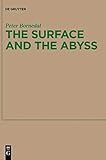The Surface and the Abyss : Nietzsche as Philosopher of Mind and Knowledge / Peter Bornedal.
Material type: TextSeries: Monographien und Texte zur Nietzsche-Forschung ; 57Publisher: Berlin ; Boston : De Gruyter, [2010]Copyright date: ©2010Description: 1 online resource (608 p.)Content type:
TextSeries: Monographien und Texte zur Nietzsche-Forschung ; 57Publisher: Berlin ; Boston : De Gruyter, [2010]Copyright date: ©2010Description: 1 online resource (608 p.)Content type: - 9783110223415
- 9783110223422
- online - DeGruyter
- Issued also in print.
| Item type | Current library | Call number | URL | Status | Notes | Barcode | |
|---|---|---|---|---|---|---|---|
 eBook
eBook
|
Biblioteca "Angelicum" Pont. Univ. S.Tommaso d'Aquino Nuvola online | online - DeGruyter (Browse shelf(Opens below)) | Online access | Not for loan (Accesso limitato) | Accesso per gli utenti autorizzati / Access for authorized users | (dgr)9783110223422 |
Browsing Biblioteca "Angelicum" Pont. Univ. S.Tommaso d'Aquino shelves, Shelving location: Nuvola online Close shelf browser (Hides shelf browser)

|

|

|

|

|

|

|
||
| online - DeGruyter Jahrbuch der Jean-Paul-Gesellschaft. Band 45, 2010 / | online - DeGruyter Historia archaeologica : Festschrift für Heiko Steuer zum 70. Geburtstag / | online - DeGruyter Honour Is in Contentment : Life Before Oil in Ras Al-Khaimah (UAE) and Some Neighbouring Regions / | online - DeGruyter The Surface and the Abyss : Nietzsche as Philosopher of Mind and Knowledge / | online - DeGruyter W.G. Sebald – Die dialektische Imagination / | online - DeGruyter Abraham and Melchizedek : Scribal Activity of Second Temple Times in Genesis 14 and Psalm 110 / | online - DeGruyter Werke. Band 6, Homilien zum Hexateuch in Rufins Übersetzung. Teil 1: Die Homilien zu Genesis (Homiliae in Genesin) / |
Frontmatter -- Table of Contents -- Introduction -- CHAPTER 1. The Narcissism of Human Knowledge. -- CHAPTER 1. The Narcissism of Human Knowledge. An Interpretation of Nietzsche’s Über Wahrheit und Lüge in the Context of 19th Century Kantianism. -- CHAPTER 2. A Silent World. -- CHAPTER 2. A Silent World. Nietzsche’s Radical Realism: World, Sensation, Language -- CHAPTER 3. Splitting the Subject. -- [CHAPTER 3. Prefatory text] Splitting the Subject. Nietzsche’s Radical Rethinking of the Cartesian and Kantian ‘I Think’ -- [CHAPTER 3.] Part I: Thinking the ‘I’ in Descartes, Kant, and Benveniste -- [CHAPTER 3.] Part II: Nietzsche’s Theories of the Split Subject -- CHAPTER 4. Theory of Knowledge as ‘Neuro-Epistemology’. -- [CHAPTER 4. Prefatory text] Theory of Knowledge as ‘Neuro-Epistemology’. Toward a Biological-Linguistic Subject in Nietzsche and Contemporaries -- [CHAPTER 4.] Part I: Nietzsche’s Contemporaries on Sensation, Cognition, and Language -- [CHAPTER 4.] Part II: Toward a ‘Biological-Linguistic’ Nietzschean subject -- [CHAPTER 4.] Part III: Reconciling Positions and Drawing up Implications -- CHAPTER 5. The Meaning of Master, Slave, and Priest: From Mental Configurations to Social Typologies -- [CHAPTER 5. Prefatory text] The Meaning of Master, Slave, and Priest: From Mental Configurations to Social Typologies -- [CHAPTER 5.] Part I: The Incredible Profundity of the Truly Superficia -- [CHAPTER 5.] Part II: On the Ideological Formatting of the Servile Configuration -- CHAPTER 6. Eternal Recurrence in Inner-Mental Life. -- CHAPTER 6. Eternal Recurrence in Inner-Mental Life. Eternal-Recurrence as Describing the Conditions for Knowledge and Pleasure -- Appendixes -- APPENDIX 1. Nietzsche and Ernst Mach on the Analysis of Sensations -- APPENDIX 2. A Theory of “Happiness”? -- APPENDIX 3. The Fragmented Nietzschean Subject and Literary Criticism -- Backmatter
restricted access online access with authorization star
http://purl.org/coar/access_right/c_16ec
Peter Bornedal provides an interpretation of Nietzsche’s philosophy as a whole in the context of 19th century philosophy of mind and cognition. The study explains Nietzsche’s notion of truth; his epistemology; his notions of the split and fragmented subject, of master, slave, and priest; furthermore, it offers a new interpretation of the enigmatic “eternal recurrence”. It also suggests how important aspects of Nietzsche’s thinking can be read as a sophisticated critique of ideology. From studies in Nietzsche’s work as a whole, not least in his so-called Nachgelassene Fragmente, the book reconstructs aspects of Nietzsche’s thinking that have largely been under-described in especially the Anglo-Saxon Nietzsche-reception. The study makes the case that Nietzsche in his epistemology, his psychology, and his cognitive theory is responding to several scientific discoveries occuring during the 19th century. Read within the context of contemporary cognitive-psychological-evolutionary debates, Nietzsche’s philosophy is seen as far more scientistic, and far less poetical-metaphysical, than it has in recent reception-history been received.
Issued also in print.
Mode of access: Internet via World Wide Web.
In English.
Description based on online resource; title from PDF title page (publisher's Web site, viewed 28. Feb 2023)


